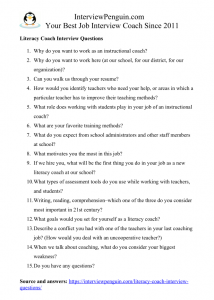When you want to improve the results of your students, you firstly need to improve the quality of your teaching. Literacy education evolves quickly, and teachers–busy with their daily routines at school, find it hard to keep up with the trends.
What’s more, not every teacher is capable of critically assessing their teaching skills, when it comes to writing, reading, and most importantly comprehension. They need someone else to tell them what they could do better, and to show them how it can be done.
Instructional coaches (often also called literary coaches) are responsible for this job. They work either directly at school (bigger educational institution), or they respond for more schools in the same district or area.
In this article we will look at some questions you may face while interviewing for this interesting job. Let’s start.
Table of Contents
Why do you want to work as an instructional coach?
Try to focus on the future, not the past. Saying that you want this job because you have a Master’s in Literacy and coaching certificate would indicate a must (you have to do the job when you already spent so much time studying the subject).
Try to show us your desire to have the role. You can either talk about the meaningful purpose, how one excellent literacy coach can improve the level of education in the entire school district, or about your skills and abilities that make from you an excellent candidate (you understand the coaching principles, watch the latest trends, know how to work with different personalities, etc).
You can also say that you enjoy coaching. Showing some passion for your profession would never hurt you in an interview.
Why do you want to work here (at our school, for our district, for our organization)?
You have a few good options at this point. One is praising the educational institution for something. This can be the value they place on continuous improvement of their teaching personnel (instructional coaches play a pivotal role in the process), great working environment, excellent reputation, and so on.
Second option consists in focusing on challenges. Perhaps their school (organization) does not achieve the same level of results as other educational institutions in the district do (or their students fall short in competition with the students from other schools). Certainly the skills of the teachers may play a role, and you want to help them improve on that aspect.
Third option is talking about more prosaic reasons. Perhaps the schedule suits you, or you live ten minutes away from the school, or prefer to coach distantly (what is their model), etc.
In any case, they should get an impression that you did your research, know something about their place, and have a clear reason why you want to work for them, instead of some other educational institution.
Can you walk us through your resume?
This can actually be the very first question (or the equivalent “Tell us about yourself”). Remember that you apply for a job of a literacy coach. Members of the hiring committee will pay a lot of attention to your communication skills.
Do you talk to the point? Do you articulate clearly? Can they understand you? Does your story make sense? Are you a good listener?
You should talk about relevant things, your education, and teaching or coaching experience. In the best case scenario you should tell them a short story (everybody loves stories and they are easy to remember).
The story starts with your education, with your search for meaning, for an ideal occupation. It continuous with your higher education, identification of the role of an instructional coach and next steps you took to be able to do this job one day (teaching, coaching, etc). It culminates right now, in this interview–you’ve done everything, and you feel ready to finally get the job of your dreams…
How would you identify teachers who need your help, or areas in which a particular teacher has to improve their teaching methods?
Try to show a proactive approach. You won’t wait in your office for a phone call of a desperate teacher, begging you for help. Such calls rarely arrive at first place. You need to go to the classes and see…
You can talk about observing teachers at classes, one on one meetings (in which you will ask each teacher a set of targeted questions that help you uncover areas for improvement), but also about assessment for students (testing their reading and writing skills) that can help you identify teachers who need your assistance.
One way or another, ensure the members of the interviewing panel that you want to go out and talk to teachers.
What role does working with students play in your job of an instructional coach?
A typical mistake is expressing your expectations to work a lot with students. This won’t be the case, however. You may do some assessments with students, or even inquire about their expectations, and impression they have from the lessons (whether they understand their teacher, what they think about their teaching methods, etc). But it isn’t the core of your job.
You can say that students play a role in your work. After all, their results determine the success of their teachers, and indirectly also your success as a literacy coach. So you plan to do some assessments and to observe them in the classes, but you understand that your main goal as a coach is to lead the team of teachers–not students.
What are your favorite training methods?
You should definitely not rely on lecturing as your main training method. Oppositely, ensure the interviewers that you plan to do the coaching in the most effective way, that means 1. practice, 2. asking right questions and letting the coached person to find the answers.
Many teachers are stubborn, and they won’t necessarily recognize the authority of your position. Telling someone what they should do, and letting them to decide about the right action on their own (with the help of right questions you ask them, questions that help them to find areas of improvement), are two completely different things. The second approach can do wonders even with uncooperative teachers.
Ensure the interviewers that you understand the nuances of this job, and of effective coaching. Mock lesson is another effective training method. You ask them to mock a lesson, record it, and then the two of you together watch it, trying to find areas for improvement…
What do you expect from school administrators and other staff members at school?
Again you have two good options at this point. One is saying that you expect an open communication and critical feedback, becasue you understand that each great school is a result of an excellent teamwork of admins, teachers, counselors, and other staff members.
You will try to build relationships of trust with your colleagues, and hope that they will share with you openly any information that could help you in your job of a literacy coach.
Another option is saying that you have the highest expectations on one person only–on yourself. Other staff members know what they are supposed to do, and it’s not your job to consider their competency or whether they could do anything better in work (with the exception of teachers, of course, becasue judging their competency and helping them to improve on their teaching skills is exactly your job).
Other questions you may get in your instructional coach interview
- What motivates you the most in this job?
- If we hire you, what will be the first thing you do in your job as a new literacy coach at our school?
- What types of assessment tools do you use while working with teachers, and students?
- Writing, reading, comprehension–which one of the three do you consider most important in 21st century?
- What goals would you set for yourself as a literacy coach?
- Describe a conflict you had with one of the teachers in your last coaching job? (How would you deal with an uncooperative teacher?)
- When we talk about coaching, what do you consider your biggest weakness?
- Do you have any questions?
* You can also download the list of all questions in a one page long PDF, and practice your interview answers anytime later:

Conclusion, next steps
Literacy (instructional) coach is a specific job title, and you typically won’t compete with many other candidates in your interview. This makes your task easier.
At the same time, however, superintendents and school principals understand the vital role a great literacy coach can play in any school. Therefor their will test you with some tricky situational and behavioral questions, just like I described in this article.
To improve your chances to succeed in this interview you should learn as much as you can about the school (district), and perhaps also about the people who will lead your interview.
Remember that people in hiring committees at schools are not professional interviewers. They are teachers, administrators, counselors, or even parents. In such circumstances, personal preferences play a major role in their decision making process. Learning as much as you can about these people and their school can help you to make a better connection with them in the interview. Such a connection can pay big time at the end…
I wish you good luck!
May also help you in your literacy coach interview preparation:


